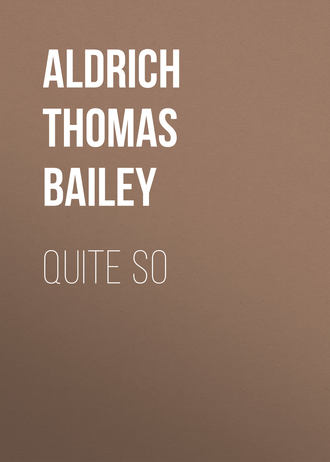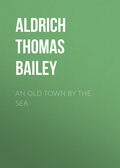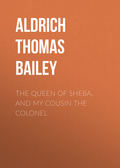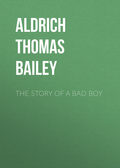
Aldrich Thomas Bailey
Quite So
“I ‘d like to say a word to you,” said Bladburn.
With a little start of surprise, I made room for him on the fallen tree where I was seated.
“I may n’t get another chance,” he said. “You and the boys have been very kind to me, kinder than I deserve; but sometimes I ‘ve fancied that my not saying anything about myself had given you the idea that all was not right in my past. I want to say that I came down to Virginia with a clean record.”
“We never really doubted it, Bladburn.”
“If I did n’t write home,” he continued, “it was because I had n’t any home, neither kith nor kin. When I said the old folks were dead, I said it. Am I boring you? If I thought I was”—
“No, Bladburn. I have often wanted you to talk to me about yourself, not from idle curiosity, I trust, but because I liked you that rainy night when you came to camp, and have gone on liking you ever since. This is n’t too much to say, when Heaven only knows how soon I may be past saying it or you listening to it.”
“That’s it,” said Bladburn, hurriedly, “that’s why I want to talk with you. I ‘ve a fancy that I sha’ n’t come out of our first battle.”
The words gave me a queer start, for I had been trying several days to throw off a similar presentiment concerning him—a foolish presentiment that grew out of a dream.
“In case anything of that kind turns up,” he continued, “I ‘d like you to have my Latin grammar here—you ‘ve seen me reading it. You might stick it away in a bookcase, for the sake of old times. It goes against me to think of it falling into rough hands or being kicked about camp and trampled underfoot.”
He was drumming softly with his fingers on the volume in the bosom of his blouse.
“I did n’t intend to speak of this to a living soul,” he went on, motioning me not to answer him; “but something took hold of me to-night and made me follow you up here, Perhaps if I told you all, you would be the more willing to look after the little book in case it goes ill with me. When the war broke out I was teaching school down in Maine, in the same village where my father was schoolmaster before me. The old man when he died left me quite alone. I lived pretty much by myself, having no interests outside of the district school, which seemed in a manner my personal property. Eight years ago last spring a new pupil was brought to the school, a slight slip of a girl, with a sad kind of face and quiet ways. Perhaps it was because she was n’t very strong, and perhaps because she was n’t used over well by those who had charge of her, or perhaps it was because my life was lonely, that my heart warmed to the child. It all seems like a dream now, since that April morning when little Mary stood in front of my desk with her pretty eyes looking down bashfully and her soft hair falling over her face. One day I look up, and six years have gone by—as they go by in dreams—and among the scholars is a tall girl of sixteen, with serious, womanly eyes which I cannot trust myself to look upon. The old life has come to an end. The child has become a woman and can teach the master now. So help me Heaven, I did n’t know that I loved her until that day!
“Long after the children had gone home I sat in the school-room with my face resting on my hands. There was her desk, the afternoon shadows falling across it. It never looked empty and cheerless before. I went and stood by the low chair, as I had stood hundreds of times. On the desk was a pile of books, ready to be taken away, and among the rest a small Latin grammar which we had studied together. What little despairs and triumphs and happy hours were associated with it! I took it up curiously, as if it were some gentle dead thing, and turned over the pages, and could hardly see them. Turning the pages, idly so, I came to a leaf on which something was written with ink, in the familiar girlish hand. It was only the words ‘Dear John,’ through which she had drawn two hasty pencil lines—I wish she had n’t drawn those lines!” added Bladburn, under his breath.
He was silent for a minute or two, looking off towards the camps, where the lights were fading out one by one.
“I had no right to go and love Mary. I was twice her age, an awkward, unsocial man, that would have blighted her youth. I was as wrong as wrong can be. But I never meant to tell her. I locked the grammar in my desk and the secret in my heart for a year. I could n’t bear to meet her in the village, and kept away from every place where she was likely to be. Then she came to me, and sat down at my feet penitently, just as she used to do when she was a child, and asked what she had done to anger me; and then, Heaven forgive me! I told her all, and asked her if she could say with her lips the words she had written, and she nestled in my arms all a-trembling like a bird, and said them over and over again.







